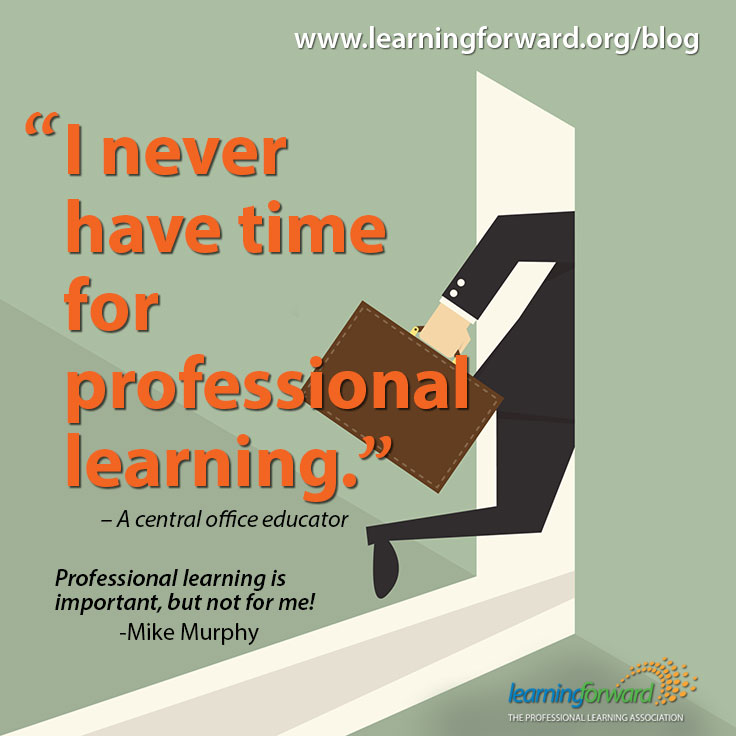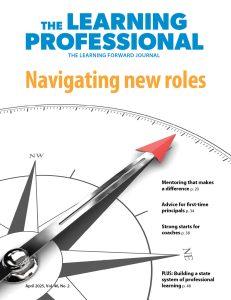Learning Forward Blog
Emerging lessons from the science of learning
By Laurie Calvert |
Emerging evidence around how students learn is so dynamic that thoughtful educators must continually recalibrate their teaching and hone their practice just to keep up with the latest scientific learning research.
5 things school leaders do that make a big difference for teachers
By Stephanie Hirsh |
Research has confirmed many times that leadership is second only to teaching in influencing student achievement. What do system and school leaders do that teachers value most and identify as most helpful in their efforts to ensure high-quality literacy and standards-based instruction for all students?
The gift that keeps on giving
By Joellen Killion |
Nearly four years ago, Learning Forward launched Transforming Professional Learning, an initiative to support educator learning for implementation of Common Core standards. Several professional associations partnered with Learning Forward to achieve the initiative’s goals and generate more than 15 products that continue to inform efforts in numerous states and districts across the nation.
How professional learning communities benefit students and teachers
By Shirley Hord |
The primary purpose and function of the professional learning community is the continuous professional learning of its members. Why is this? The most influential factor in whether students learn well is quality teaching. Research and common sense tell us that continuous and sustained adult learning enhances quality teaching. What are educators in a professional learning community learning?
Let’s raise our voices together
By Deborah Jackson |
Over the past 30-plus years, Deborah Jackson has attended many education conferences. In this blog post, she reflects on how her conference needs have changed along with her roles as she moved from teacher to principal to learning administrator, and finally to her role as president of Learning Forward’s board of trustees.
How policy can strengthen the principalship
By Frederick Brown |
At a School Leadership Preparation and Development Network Conference, Paul Manna talked about his recently released Wallace Foundation-commissioned study, Developing Excellent School Principals to Advance Teaching and Learning: Considerations for State Policy. Manna’s report addresses several questions, including: What can policymakers do to help ensure that schools have excellent principals and advance teaching and learning for their students?
Why do I go to the conference? It’s where conversation, collaboration, and critical thinking abound
By Mark Onuscheck |
Over the past three years, Learning Forward’s Annual Conferences have provided me with some of the best professional learning experiences in my career. Not only do the conferences bring together leading minds in education, they also open up important dialogue around continuous improvement.
Understanding the Impact of Professional Learning: Q&A with Learning Forward Academy Scholarship Winners
By Juliet Correll |
In December 2012, I graduated from the Learning Forward Academy (LFA), a compelling two and a half year blended learning experience where participants collaboratively solve significant “problems of practice” related to educator and student learning. Nearly three years later, here’s a glimpse into what other graduates learned and how it is impacting their spheres of influence.
Professional learning is important, but not for me!
By Mike Murphy |
I was about to facilitate professional learning with school leaders in a large, urban school district a few months ago. The topics had been planned, the content and process had been reviewed, and I was ready to go. Right before my time started, I had the opportunity to meet the central office educator who was in the room and, according to the organizational chart, in charge of school improvement, instruction, and student performance.
The power of words to spark positive change
By Dawn Wilson |
How do you use the power of words to spark positive change? How are words being used in your setting to create a culture of caring? Words matter. They can offer perspective, insight, and understanding. Words can bring encouragement and hope.





